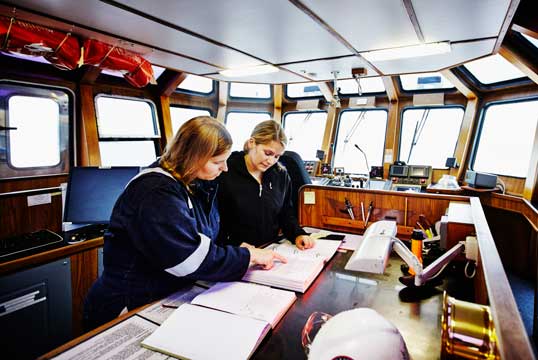
Whether you have stumbled into a maritime career by chance, by family tradition, or via a non-seafaring route, you may find mentoring can help with your career progress, and it's a way in which people from disadvantaged backgrounds can get a boost that others get from going to the 'right' schools or having the 'right' contacts
Planning a move ashore is something where having a mentor could particularly help you.
A Nautilus International survey in 2019 found that many seafarers do not get much information from their employers on the opportunities that exist ashore, and most are unaware of what additional qualifications or training they might need to make the most of a career move. That is why the Union set up the Sea to City mentoring initiative.
What is mentoring?
A mentor is a person who can support, advise and guide you in your career. The mentor might be a peer within your organisation or an external coach or trainer.
What could a maritime mentor offer me?
Having a specifically maritime mentor could mean you get:
- advice on timing for making the switch from sea to shore
- details about onshore positions that can be achieved dependent on seagoing rank
- guidance on the skills and knowledge required in the maritime services sector
- key contacts and networking
- retraining advice and support
- help advancing your career
What mentoring pathways are available?
The Nautilus Sea to City mentoring programme pairs seafarers looking to move ashore with maritime professionals in the UK maritime services sector. See page 37 to find out how to take part.
Other ways to make use of mentoring are to network with colleagues in your organisation, find a careers coach to help you with your goals or join an industry mentoring programme.
The UK industry body Maritime UK is planning to set up a nationwide maritime mentorship scheme and is currently looking for sponsors.

Tackling racism onboard
In a multicultural crew setting, it is important to spot and address racism of any kind, whether overt or 'low-level'. After all, the alternative is conflict between colleagues and often the loss of experienced workers who have had enough of this form of discrimination.
Many workplaces around the world are now trying to be more conscious of the effect of 'micro aggressions' – those subtle intentional or unintentional insults towards a certain cultural group which can build up to create significant distress.
How to tackle this behaviour in the maritime workplace was addressed during the Ethnicity in Maritime roundtable held during London International Shipping Week 2021.
Examples of micro-aggressions
Micro-aggressions can be physical, such as inappropriately touching hair in braids or afro styles. They can also include words that make the colleague feel 'foreign' or not belonging, such as saying 'Yes, but where are you really from?'
What can I do to help?
- Learn about verbal and non-verbal micro-aggressions as part of company training on unconscious bias
- Ask what systems, policies and open conversations a company has that shows it is anti-racist
- Enlist allies – it is not just the problem of a particular group
- Don't give up on conversations about race just because people may feel uncomfortable
Tags
More articles
Sea to city transitions: The hard work was worth it!
Get involved: Sea to City
Sea to City is a joint initiative between Nautilus International and Maritime London, which pairs people currently working in the UK maritime services sector with those at sea who may be considering a move.
